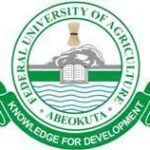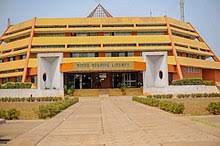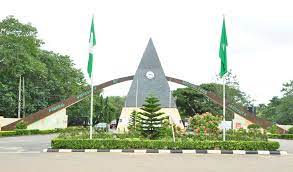Description
When it comes to higher education in Nigeria, the Federal University of Agriculture, Abeokuta (FUNAAB) stands as a shining example of academic excellence and innovation.
Founded in 1988, FUNAAB is one of the three universities of agriculture in Nigeria, and it has consistently proven itself as a hub of knowledge and opportunity.
In this post, I will go into the various facets of FUNAAB, its commitment to academic excellence, its extensive academic programs, and its pivotal role in research and development.
A Gateway to Excellence
Nestled in the vibrant city of Abeokuta, Ogun State, FUNAAB serves as a gateway to a world of knowledge and limitless possibilities.
The university’s main gate, beautifully adorned with its name, welcomes students, faculty, and visitors alike.
This prestigious institution has earned its reputation as a center of educational excellence, and its main gate symbolizes the entrance to a world of opportunity.
The Foundation of FUNAAB
Founded in 1988, FUNAAB has a rich history that spans over three decades.
This federal university was established with a clear vision of nurturing the next generation of leaders in agriculture, science, engineering, and the humanities.
It is dedicated to providing a platform for students to excel, innovate, and contribute to the nation’s growth and development.
A Home to Over 25,000 Students
With a student population of over 25,000, FUNAAB is a bustling academic community.
This diverse student body hails from various parts of Nigeria and beyond, coming together to explore their academic passions.
FUNAAB offers a wide range of undergraduate and postgraduate programs, ensuring that students can pursue their dreams and specialize in their areas of interest.
A Spectrum of Academic Programs
FUNAAB boasts a diverse range of academic programs that cater to a wide spectrum of disciplines.
Whether your passion lies in agriculture, science, engineering, or the humanities, FUNAAB has something to offer.
The university provides a nurturing environment where students can explore their interests and receive quality education that equips them for the real world.
The Spirit of Research and Development
One of FUNAAB’s defining characteristics is its strong focus on research and development.
The faculty members are not just educators; they are active participants in numerous research projects.
Their dedication to advancing knowledge and finding solutions to real-world problems makes FUNAAB a beacon of progress in Nigeria.
Ranking Among the Best
FUNAAB is not just any university; it is a well-respected institution that stands among the top universities in Nigeria.
Its commitment to excellence in teaching and research has been consistently recognized.
The university’s name is synonymous with quality education, and its graduates are highly sought after by employers across the country and beyond.
Federal University Of Agriculture, Abeokuta Courses
If you’re considering a higher education journey in the field of agriculture, the Federal University of Agriculture, Abeokuta (FUNAAB), located in Nigeria, offers a wide range of undergraduate and postgraduate courses that can shape your future and open doors to exciting career opportunities.
In this post, I’ll explore the diverse array of programs that FUNAAB provides to aspiring students.
Why FUNAAB?
Before delving into the specifics of the courses offered, it’s important to understand why FUNAAB is a reputable choice for agricultural education. FUNAAB is known for its commitment to excellence, quality, and innovation in agricultural education.
The institution boasts a rich history and an impressive faculty of experts who are dedicated to nurturing the next generation of agricultural professionals.
Let’s begin our journey by exploring the undergraduate courses offered at FUNAAB.
Undergraduate Courses
1. Agricultural Administration
Agricultural Administration at FUNAAB prepares students for leadership roles in the agricultural sector.
Graduates of this program are equipped with the knowledge and skills needed to manage and administer agricultural enterprises efficiently.
2. Agricultural Economics and Farm Management
This program focuses on the economics of agriculture, teaching students how to make sound financial decisions in the farming and agribusiness sector.
Graduates often become key players in ensuring economic sustainability in agriculture.
3. Agricultural Engineering
Agricultural Engineering merges engineering principles with agricultural sciences.
Students learn how to design and develop equipment and machinery for farming, contributing to increased efficiency and sustainability in agriculture.
4. Animal Breeding and Genetics
This program explores the science of improving livestock through selective breeding and genetic techniques.
It plays a vital role in enhancing animal productivity and the quality of animal products.
5. Animal Nutrition
Animal Nutrition is essential for understanding the dietary requirements of livestock and pets.
Graduates in this field contribute to the development of balanced animal diets, ensuring their health and productivity.
6. Animal Physiology, Animal Production, and Health
This multidisciplinary program combines the study of animal physiology and health with effective animal production management.
Graduates often work in diverse roles within the animal husbandry sector.
7. Aquaculture and Fisheries Management
As the demand for seafood continues to rise, this program equips students with the knowledge and skills required for the sustainable management of aquaculture and fisheries.
8. Biochemistry
Biochemistry is a fundamental field of science with applications in agriculture and various other industries.
Graduates in this discipline often find themselves at the forefront of research and development.
9. Biological Sciences
Biological Sciences provide a broad foundation for understanding the natural world.
Graduates can pursue careers in various fields, including environmental conservation and research.
10. Botany
Botany focuses on the study of plants, their growth, and interactions with the environment.
Graduates often work in areas related to plant conservation, agriculture, and research.
11. Chemistry
Chemistry is a versatile field that plays a crucial role in agriculture, especially in areas such as soil chemistry and agrochemical development.
12. Computer Science
In the digital age, Computer Science is indispensable in agriculture.
Graduates are involved in developing software, data analysis, and automation in various agricultural processes.
13. Crop Protection
Crop Protection experts play a critical role in safeguarding agricultural yields by identifying and managing pests and diseases.
Their work is crucial for food security.
14. Dietetics and Nutrition
Dietetics and Nutrition are integral to promoting healthy eating habits and addressing nutritional challenges in agriculture, particularly in food processing.
15. Economics
Economics in the context of agriculture is about understanding and optimizing resource allocation.
Graduates help in shaping agricultural policies and practices.
16. Environmental Management and Toxicology
As the need for environmental sustainability grows, this program equips students to assess and manage environmental risks in agriculture.
17. Estate Management
Estate Management experts oversee the development and maintenance of agricultural properties, ensuring their efficiency and profitability.
18. Food Science and Technology
This field is vital for ensuring the safety, quality, and innovation of food products.
Graduates contribute to food processing and preservation.
19. Forestry and Wildlife Management
Forestry and Wildlife Management professionals play a crucial role in conserving and managing forests and wildlife resources.
20. Geology
Geology has applications in understanding soil composition, geological hazards, and natural resource exploration in agriculture.
21. Horticulture
Horticulture is about cultivating fruits, vegetables, and ornamental plants.
Graduates often find opportunities in landscaping and crop production.
22. Mathematics
Mathematics is fundamental in agricultural data analysis, modeling, and decision-making, contributing to the optimization of agricultural processes.
23. Microbiology
Microbiology is essential in understanding and managing microorganisms in agriculture, including soil and plant health.
24. Physics
Physics has applications in agricultural technology and instrumentation, contributing to advancements in farming practices.
25. Plant Breeding and Seed Technology
This program focuses on improving crop plants through selective breeding and seed technology, contributing to food security.
26. Plant Physiology and Crop Production
Plant Physiology and Crop Production experts study plant growth and development to enhance crop yields.
27. Pure and Applied Zoology
This program looks into the study of animals and their applications in agriculture, including pest management and conservation.
28. Soil Science and Land Management
Soil Science is integral to understanding soil properties, composition, and management for sustainable agriculture.
29. Statistics
Statistics is crucial for data analysis and decision-making in agriculture, contributing to efficient resource allocation.
30. Veterinary Medicine
Veterinary Medicine is essential for animal health and welfare, making it an integral part of agriculture.
31. Water Resources Management and Agro-meteorology
This program focuses on the sustainable management of water resources and meteorological aspects relevant to agriculture.
Postgraduate Courses
FUNAAB also offers a range of postgraduate courses, including:
1. Master of Agriculture (M.Agric)
This program allows students to deepen their knowledge and research skills in various agricultural disciplines, making them experts in their chosen field.
2. Doctor of Philosophy (Ph.D)
The Ph.D. program offers an opportunity for advanced research, contributing to the advancement of knowledge in agriculture.
3. Postgraduate Diploma (PGD)
The PGD program provides a foundation for further postgraduate studies and career development in agriculture.
For more information regarding the courses offered visit the school official website
Federal University Of Agriculture, Abeokuta School Fees
Are you a prospective student looking to enroll at the Federal University of Agriculture, Abeokuta (FUNAAB) for the 2022/2023 academic session? One of the essential aspects to consider is the school fees.
In this post, I will break down the cost of education at FUNAAB and provide valuable insights to help you plan your finances.
Acceptance Fee: N35,700
Your journey at FUNAAB begins with the acceptance fee. For the 2022/2023 academic session, the acceptance fee stands at N35,700.
This fee is applicable to all students who have successfully secured admission to the university.
Tuition Fees
The tuition fees at FUNAAB are structured differently for various colleges.
Here’s a breakdown of the tuition fees based on the college you are enrolled in:
College of Agricultural Management and Rural Development (COLAMRUD): N150,000
Students pursuing their education at the College of Agricultural Management and Rural Development (COLAMRUD) will pay a tuition fee of N150,000 per session.
College of Animal Science and Livestock Production (COLANIM): N150,000
If you are passionate about animal science and livestock production, the tuition fee for students at the College of Animal Science and Livestock Production (COLANIM) is also N150,000 per session.
College of Engineering (COLENG): N200,000
Engineering students at FUNAAB, enrolled in the College of Engineering (COLENG), will be required to pay a tuition fee of N200,000 per session.
College of Food Science and Human Ecology (COLFHEC): N150,000
The College of Food Science and Human Ecology (COLFHEC) charges a tuition fee of N150,000 per session for students interested in this field.
College of Forestry and Wildlife Management (COLFORWIL): N150,000
For those passionate about forestry and wildlife management, the tuition fee at the College of Forestry and Wildlife Management (COLFORWIL) is set at N150,000 per session.
College of Natural Sciences (COLNAS): N150,000
Students pursuing natural sciences at FUNAAB, within the College of Natural Sciences (COLNAS), will pay a tuition fee of N150,000 per session.
College of Plant Science and Crop Production (COLPLANT): N150,000
For students interested in plant science and crop production, the tuition fee at the College of Plant Science and Crop Production (COLPLANT) is N150,000 per session.
College of Veterinary Medicine (COLVET): N200,000
Future veterinarians studying at the College of Veterinary Medicine (COLVET) will pay a tuition fee of N200,000 per session.
Other Fees
Apart from tuition and acceptance fees, FUNAAB also requires students to pay a range of other fees to support various services and facilities.
Here’s a glimpse of these additional fees:
- Medical Fee: N10,000 per session.
- Sports Fee: N5,000 per session.
- Students’ Union Fee: N5,000 per session.
- Alumni Fee: N1,000 per session.
- ICT Fee: N10,000 per session.
- Examination Fee: N5,000 per session.
The accommodation fee varies depending on the type of accommodation you select.
Total Fees
The total fees you will need to pay for your education at FUNAAB depend on your course of study and your accommodation choice.
However, as a general guideline, students can expect to pay between N250,000 and N350,000 per session.
Payment Deadline
It’s crucial to note that all fees must be paid on or before the deadline set by the university.
Failing to meet these deadlines may result in late payment penalties, which can be an unnecessary financial burden for students.
To get more in-depth information regarding the school fees, visit Federal University of Agriculture Abeokuta School Fees
Federal University Of Agriculture, Abeokuta Admission Requirement
If you’re aspiring to join the prestigious Federal University of Agriculture, Abeokuta (FUNAAB), understanding the UTME requirements is your first step toward achieving your academic dreams.
In this post, i will break down the essential criteria and specific subject requirements to help you prepare effectively for your academic journey at FUNAAB.
Meeting the First Criteria
The first step to gaining admission to FUNAAB is choosing the institution as your Most Preferred Institution on the JAMB form.
This critical decision sets the stage for your future at this esteemed university.
Make sure you’ve filled out your JAMB form correctly to reflect FUNAAB as your academic destination.
Scoring Adequately in UTME
In the 2023/2024 academic year, the UTME cutoff mark for FUNAAB is set at a minimum of 160.
Achieving this score is vital, as it’s the gateway to your admission into this institution.
Dedicate yourself to preparing for the examination to secure your spot at FUNAAB.
Meeting O’Level Credit Requirements
To be eligible for admission, candidates must possess a minimum of five (5) O’Level Credit passes in relevant subjects.
These passes should be obtained in one or two sittings in SSCE, GCE, NECO, or NABTEB.
This requirement emphasizes the importance of a strong academic foundation and dedication to your studies.
Specific Subject Requirements
To ensure that you meet the specific subject requirements for your chosen course, here is a breakdown of the subject combinations for various fields of study:
Agricultural Administration, Agricultural Economics and Farm Management, Animal Science, Crop Science, Forestry and Wildlife Management, Horticulture, Plant Science, and Crop Production, Soil Science and Land Management
- English Language
- Mathematics
- Biology
- Chemistry
- Any other relevant subject
Biochemistry, Biological Sciences, Botany, Microbiology, Zoology
- English Language
- Mathematics
- Biology
- Chemistry
- Physics
Computer Science, Mathematics, Statistics
- English Language
- Mathematics
- Physics
- Any other relevant subject
Chemistry, Environmental Management and Toxicology, Food Science and Technology, Geology
- English Language
- Mathematics
- Chemistry
- Physics
- Any other relevant subject
Animal Production and Health, Fisheries Management, Veterinary Medicine
- English Language
- Mathematics
- Biology
- Chemistry
- Physics
Engineering Courses
- English Language
- Mathematics
- Physics
- Chemistry
- Any other relevant subject
Direct Entry Requirements
For candidates pursuing direct entry into FUNAAB, the following qualifications are necessary:
- Minimum of Upper Credit at ND or HND in a relevant discipline.
- Credit at NCE in the same relevant discipline.
- Two (2) A’level passes or their equivalents in Mathematics, Economics, and other Commercial, Vocational, or Science subjects.
Adhering to these requirements is crucial to enhance your chances of securing a spot at FUNAAB through the direct entry program.
Conclusion
In conclusion, the Federal University of Agriculture, Abeokuta (FUNAAB), is a testament to the power of education and research.
With a rich history, a diverse student body, and a commitment to excellence, FUNAAB is at the forefront of higher education in Nigeria.
As a student, a prospective student, or anyone interested in the advancement of knowledge and research, FUNAAB is a name to remember.
Its influence extends far beyond its main gate, and its graduates are shaping the future.
FUNAAB is a place where academic dreams come to life, and it continues to be a driving force for progress in Nigeria.






